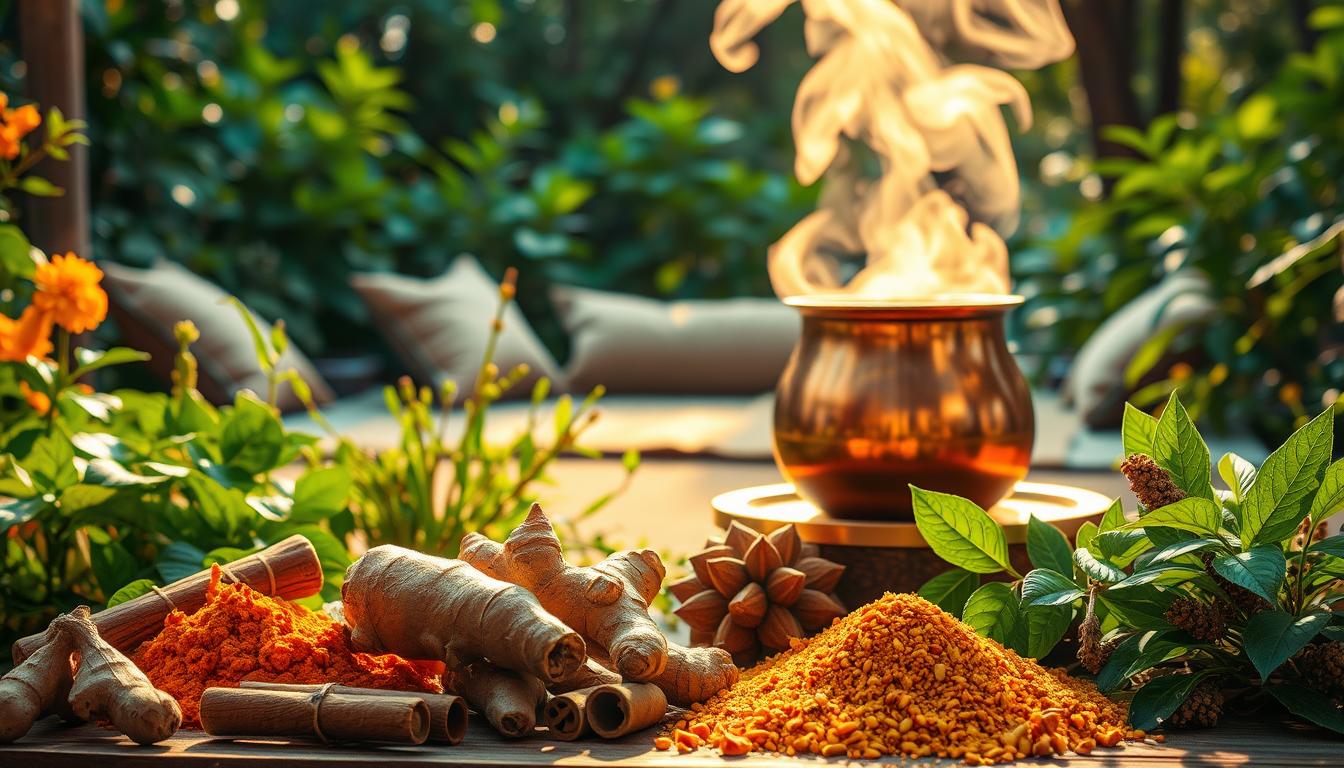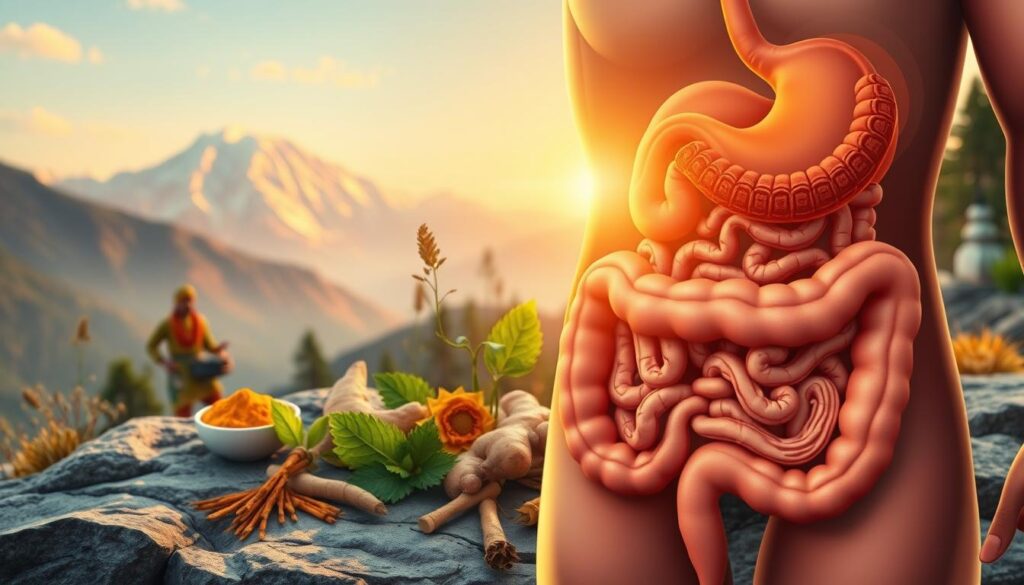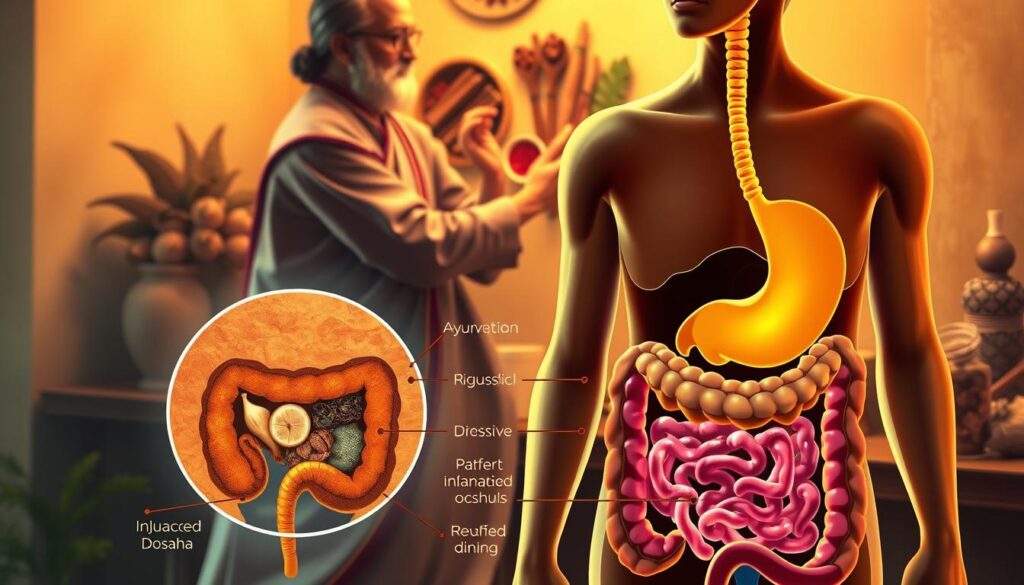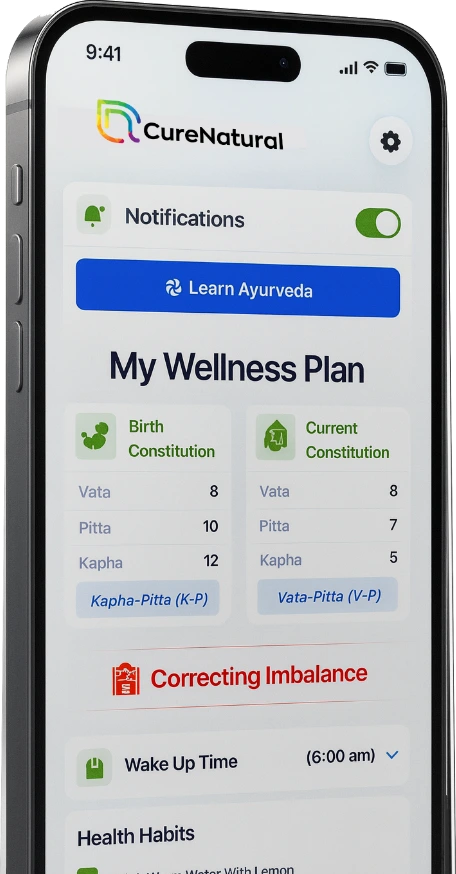Are you tired of feeling sluggish and uncomfortable in your own skin? Chronic inflammation can be the culprit, affecting not just your gut, but your overall well-being. But what if you could find a natural way to cool your gut and reset your body?
Ayurveda, an ancient Indian practice, offers a holistic approach to reducing gut inflammation and promoting overall health. By understanding the root causes of inflammation and using natural remedies, you can start to feel the benefits of a balanced body.
This article will guide you through Ayurveda’s anti-inflammation blueprint. It will provide you with practical tips and insights on how to cool your gut and reset your body using natural inflammation treatment methods.
Key Takeaways
- Understanding the causes of gut inflammation
- Ayurvedic approaches to reducing inflammation
- Natural remedies for cooling the gut
- Practical tips for resetting your body
- The importance of balance in overall well-being
Understanding the Ayurvedic View of Inflammation
Ayurveda looks at inflammation through the lens of the three doshas and digestive fire. It sees the body’s inflammation response tied to your constitutional type and balance. This balance is key to health.
The Three Doshas and Their Relationship to Inflammation
The doshas – Vata, Pitta, and Kapha – are central to inflammation. Pitta types often face inflammation because of their heat. Knowing your dosha helps fight inflammation.
How Agni (Digestive Fire) Affects Your Health
Agni, or digestive fire, is essential for digestion and nutrient use. A weak Agni leads to toxin buildup and inflammation. Too much Agni causes internal heat and inflammation. So, balancing Agni is vital to reducing inflammation naturally.
| Dosha | Characteristics | Inflammation Tendency |
|---|---|---|
| Vata | Cold, dry, light | Prone to irregular inflammation |
| Pitta | Hot, sharp, liquid | High risk of inflammatory conditions |
| Kapha | Cold, heavy, slow | Susceptible to chronic inflammation |
Understanding dosha and Agni balance helps fight inflammation naturally. It’s a big step towards better health.
The Root Causes of Gut Inflammation According to Ayurveda
Ayurveda points out several main reasons for gut inflammation. It offers a complete view of how to tackle this issue. Knowing these causes helps people start treating inflammation naturally and fix their digestive system.
Weak Digestion and Internal Heat Connection
In Ayurveda, weak digestion leads to gut inflammation. A weak digestive fire (Agni) causes undigested food to build up. This leads to internal heat and inflammation. So, making digestion stronger is key to preventing and treating gut inflammation.
Lifestyle Factors That Aggravate Your Digestive System
Lifestyle choices greatly affect gut health. Bad eating habits, too much processed food, and not moving enough can cause inflammation. Ayurveda stresses the need for a balanced lifestyle to keep the digestive system healthy.
Emotional Patterns That Disrupt Gut Health
Stress and negative emotions also harm gut health, Ayurveda says. Stress weakens digestion and causes inflammation. Using stress-reducing methods like meditation and yoga can help. These practices support gut health.
By tackling these main causes—weak digestion, lifestyle issues, and emotional stress—people can take a full approach to treating inflammation naturally. This helps maintain gut health for the long term.
Identifying Your Dosha Type for Targeted Healing
Starting your journey to reduce inflammation means first knowing your body’s makeup. In Ayurveda, this makeup is called your “dosha type.” It can be Vata, Pitta, or Kapha. Each dosha has its own traits that shape how your body reacts to inflammation.
Characteristics of Vata, Pitta, and Kapha Constitutions
People with a Vata constitution are often creative and full of energy. But, they might face dryness and irregular body functions. Those with a Pitta constitution are smart and passionate, but they can get angry and have heat problems. Kapha types are calm and steady, but they might gain weight and have slow digestion.
How Your Dosha Affects Your Inflammation Response
Your dosha type greatly influences how your body fights inflammation. For example, Pitta types tend to get inflammatory diseases because of their heat. So, Pitta people need cooling and calming treatments to fight inflammation.
Vata types might do well with nourishing and grounding practices to fight dryness and anxiety. Kapha types need stimulating and detoxifying methods to tackle stagnation and mucus problems.
| Dosha Type | Characteristics | Inflammation Response |
|---|---|---|
| Vata | Creative, Active, Dry | Dryness, Anxiety-related inflammation |
| Pitta | Intelligent, Passionate, Hot | Heat-related inflammation, Anger |
| Kapha | Calm, Stable, Heavy | Stagnation, Mucus-related issues |
Knowing your dosha and its effect on inflammation helps you find the right ways to fight it naturally. This way, you can improve your health and well-being.
Ayurvedic Dietary Principles for Cooling the Gut
Learning about Ayurvedic diet can help you reduce inflammation naturally and balance your gut. This system highlights the role of food in gut health and overall wellness.
Warming Foods vs. Heating Foods: Understanding the Difference
In Ayurveda, foods are grouped by their body temperature effect. Warming foods boost digestion and raise body heat. On the other hand, heating foods can cause too much heat, leading to inflammation. For example, spicy foods are heating and can worsen acid reflux and gut inflammation.
The Six Tastes and Their Impact on Inflammation
Ayurveda identifies six tastes: sweet, sour, salty, pungent, bitter, and astringent. Each taste affects the body differently. For instance, bitter and sweet tastes cool the body and can lower inflammation. Eating foods like leafy greens and sweet fruits is beneficial.
“The six tastes are not just about flavor; they have a profound impact on our physiology and can be used therapeutically to balance our dosha.”
Creating Balanced Meals for Your Dosha Type
To cool the gut and reduce inflammation, eating according to your dosha type is key. For example, those with a Pitta dosha should eat cooling, sweet, and bitter foods. People with Vata or Kapha doshas need different diets. A balanced meal should mix various tastes and match the individual’s constitution.
By following these Ayurvedic dietary rules, you can greatly reduce gut inflammation and improve your health.
Healing Herbs to Reduce Gut Inflammation
Healing herbs are a great way to treat inflammation naturally, focusing on the gut. Ayurvedic medicine has known about these herbs for a long time. They help calm and heal the digestive system.
The Turmeric Paradox: Beneficial for Some, Harmful for Others
Turmeric is famous for its anti-inflammatory properties, thanks to curcumin. But, it can be bad for people with a Pitta constitution. It might make heartburn or acidity worse.
Balancing Herbs: Neem and Aloe Vera for Cooling Effects
Herbs like Neem and Aloe Vera can balance out turmeric’s heat. Neem cleanses, and Aloe Vera soothes the gut. They work together to make a formula that fits your dosha.
Creating Dosha-Specific Herbal Formulations
When making herbal formulas, think about your dosha. Vata people need warming herbs, while Pitta needs cooling ones. Here’s a table with some dosha-specific herbs.
| Dosha Type | Recommended Herbs | Benefits |
|---|---|---|
| Vata | Ginger, Turmeric | Warming, anti-inflammatory |
| Pitta | Aloe Vera, Neem | Cooling, soothing |
| Kapha | Turmeric, Black Pepper | Stimulating digestion, anti-inflammatory |
Knowing your dosha and choosing the right herbs helps make personalized natural inflammation treatment. This way, the remedies are not just effective but also safe for you.
Spices as Medicine: Strategic Use for Different Body Types
In Ayurvedic practice, spices are more than just flavor enhancers. They are used as medicine to balance the body’s constitution. The right spices can help reduce inflammation naturally, which is key for health.
Cooling Spices for Pitta-Dominant Individuals
Pitta-dominant individuals often feel too hot in their bodies, leading to inflammation. Cooling spices like coriander, cumin, and fennel can cool this heat. These spices are easy to add to meals and help reduce inflammation naturally.
Warming Spices for Vata and Kapha Types
Warming spices are better for Vata and Kapha types. They help with digestion and circulation. Spices like ginger, turmeric, and black pepper add warmth and support digestion, helping to reduce inflammation.
Creating Balanced Spice Blends for Your Constitution
Making a balanced spice blend is an art. It’s about knowing the qualities of spices and how they affect your body type. For example, Pitta-dominant individuals might need cooling spices, while Vata or Kapha types might need warming ones.
| Body Type | Beneficial Spices | Benefits |
|---|---|---|
| Pitta | Coriander, Cumin, Fennel | Cooling, reduces inflammation |
| Vata & Kapha | Ginger, Turmeric, Black Pepper | Warming, stimulates digestion |
Understanding and using spices as medicine is a proactive health approach. It helps reduce inflammation naturally. This personalized spice use not only adds flavor but also boosts well-being.
Daily Routines (Dinacharya) to Reset Your Digestive System
Creating a daily routine, or Dinacharya, is key for a healthy digestive system. It involves practices that help your body’s rhythms and improve your health.
Morning Practices for Optimal Digestion
Starting your day with a routine can boost your digestion. This includes:
- Drinking warm water to hydrate and cleanse your digestive system
- Doing gentle exercise, like yoga, to help digestion
- Eating a light breakfast that’s easy to digest
These morning habits set a good tone for the day and support digestion.
Meal Timing and Spacing for Reduced Inflammation
When and how often you eat affects inflammation. It’s best to:
- Eat your main meal at lunch when your Agni (digestive fire) is at its peak
- Space out meals for better digestion and to avoid overeating
- Not eat too late at night to let your digestive system rest
Following these tips can reduce inflammation and improve digestion.
Evening Rituals to Support Overnight Healing
Evening rituals can help your body heal while you sleep. This includes:
- Practicing relaxation techniques, such as meditation or deep breathing
- Enjoying a warm, soothing drink, like herbal tea
- Going to bed at a reasonable hour for good rest
These evening habits help you sleep well and support your body’s repair.
Practical Steps to Combat Gut Inflammation Naturally
To cool your gut and reset your body, you need a full plan. This includes simple meals, the right spices, and calming routines. These steps help lower inflammation and boost your overall health.
Implementing Warm, Simple Meals
Begin by making your diet simpler with warm, easy-to-digest foods. Stay away from hard or heavy foods that can upset your stomach. Choose nourishing soups, stews, and cooked veggies that are gentle on your gut.
Incorporating Appropriate Spices Based on Your Dosha
Spices are key in Ayurvedic cooking. For Pitta types, cooling spices like coriander and fennel can reduce inflammation naturally. Vata and Kapha types might find relief in warming spices like ginger and turmeric.
Establishing Consistent Eating Routines
Being consistent with your meals is important. Set a regular eating schedule that fits your natural rhythm. This keeps your digestive fire healthy and lowers inflammation.
Integrating Calming Practices Throughout Your Day
Along with diet changes, adding calming practices like meditation, deep breathing, or yoga can reduce stress and inflammation. Make sure to include these activities in your daily routine to support your gut health.
By following these steps, you can naturally reduce inflammation and live a healthier, more balanced life.
Breathwork and Meditation Techniques to Cool Internal Heat
Incorporating breathwork and meditation into your daily routine can help fight inflammation naturally. These practices reduce internal heat, a major cause of inflammation. They also help keep your digestive system in balance.
Cooling Pranayama Practices
Pranayama, or breath control, is a key tool in Ayurveda for managing internal heat. Sheetali Pranayama, or the “cooling breath,” is very effective. To do it, curl your tongue and inhale through it, then exhale through your nose. This lowers internal heat and calms your digestive system.
Alternate Nostril Breathing is also beneficial. It balances your breath and calms your nervous system, reducing inflammation.
Meditation Approaches for Digestive Harmony
Meditation is key for better digestive health by reducing stress and improving overall well-being. Focused meditation on your digestive system can heal and balance it. Imagine a soothing light around your abdomen, calming inflammation and aiding digestion.
Mindfulness meditation is another great method. It’s about being present, observing your thoughts and body without judgment. Regular practice can greatly reduce internal heat and inflammation.
By adding these breathwork and meditation practices to your daily life, you can cool internal heat and improve digestion. This helps in natural inflammation treatment and boosts your overall health.
Ayurvedic Cleansing Protocols for Resetting Your Gut
Gut health is key to feeling good. Ayurvedic cleansing protocols offer a soft yet powerful way to fix it. By adding these steps to your day, you can cut down on inflammation and boost your health.
Gentle Daily Detoxification Practices
Every day, Ayurvedic health focuses on detox. Start with warm water in the morning, try nasal cleansing (neti), and do a gentle abdominal massage. These actions kickstart digestion and help get rid of toxins. Doing these daily keeps your gut healthy and stops toxins from piling up.
When and How to Consider a Deeper Cleanse
For ongoing digestive problems or feeling off-balance, a Panchakarma cleanse might be needed. Always talk to an Ayurvedic practitioner to figure out the right cleanse for you. They’ll help pick the best cleanse based on your health and needs.
Post-Cleanse Integration Strategies
After a cleanse, it’s important to keep up healthy habits. Eat an Ayurvedic diet that fits your dosha, use stress-reducing methods like meditation, and keep up with gentle detox. This keeps the cleanse benefits going and helps you stay inflammation-free.
Embracing Ayurvedic cleansing steps is a big step towards a balanced gut and better health. Remember, it’s all about being consistent and patient. Let your body heal and adjust slowly.
Ayurvedic Remedies for Acute Gut Inflammation
Ayurvedic remedies are a natural way to treat acute gut inflammation. Ayurveda, an ancient Indian medicine, focuses on treating the root causes. It tailors treatments to fit each person’s unique needs.
Immediate Relief Formulations
For quick relief, Ayurvedic experts suggest using herbs like licorice root and aloe vera. These herbs are natural anti-inflammatories. They help soothe the digestive tract and lessen inflammation.
When to Use Cooling vs. Warming Treatments
Choosing between cooling and warming treatments depends on your dosha. People with a Pitta dosha might need cooling treatments. Those with Vata or Kapha doshas might benefit from warming therapies.
Customizing Remedies for Your Specific Symptoms
Customization is essential in Ayurvedic treatment. Practitioners tailor remedies based on your symptoms, constitution, and health. Here’s a table showing common symptoms and Ayurvedic remedies:
| Symptom | Ayurvedic Remedy |
|---|---|
| Burning sensation in the gut | Cooling herbs like aloe vera and coconut water |
| Bloating and gas | Warming spices like ginger and cumin |
| Diarrhea | Soothing formulations with licorice root and slippery elm |
Knowing your unique constitution and symptoms helps you target your treatment. This way, you can treat gut inflammation naturally.
Conclusion: Your Path to Sustained Gut Health and Whole-Body Wellness
Starting with Ayurvedic principles can change your life. It helps balance your gut and boosts overall health. Knowing your dosha type and making dietary changes can lower gut inflammation.
Adding herbs and spices, following digestive-friendly routines, and doing breathwork and meditation helps a lot. These natural steps calm your gut and improve your overall health.
To keep your gut healthy, eat a balanced diet that fits your dosha. Eat mindfully and manage stress well. This way, you naturally reduce inflammation and strengthen your digestive system. It’s a holistic way to control your health and live a more vibrant life.
Remember, patience and consistency are important on this journey. By using Ayurvedic methods every day, you can find lasting relief from gut inflammation. You’ll also connect more deeply with your body.
References:
Peng Y, et al. Anti-Inflammatory Effects of Curcumin in the Treatment of Experimental and Clinical Studies. PMCID : PMC8572027. 2021. PMC
Harvard Health. Turmeric benefits: A look at the evidence. Mar 22 2024. Harvard Health






